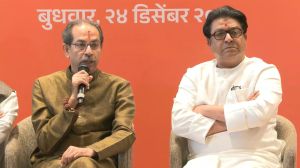“Had the Prime Minister (Manmohan Singh) insisted on transparency, the course of political history of this country would have been different… Had he stood steadfastly by his beliefs, the fate of the Indian economy would have been very different.’’
These are some of the scathing observations made by former Comptroller and Auditor General Vinod Rai in his yet-to-be released book, Not Just an Accountant — a critique of the government that appointed him as well as a spirited defence of the office and role of the CAG.
Citing some confidential correspondence, he has listed how, in case study after case study — whether it is the 2G case, Commonwealth Games, allocation of coal blocks or the functioning of Air India — “motivated decisions” and “cronies emerging out of the turf” are to blame.

ALSO READ: Manmohan Singh was part of the decisions to allocate 2G spectrum, coal blocks: Ex-CAG Vinod Rai
According to Rai, a scrutiny of government files revealed that in the 2G and coal blocks cases, Singh chose to look the other way even after being cautioned. Referring to the 2G case, he writes, “You (Singh) engaged in a routine and distanced handling of the entire allocation process, inspite of the fact that the then Communications Minister, A Raja, had indicated to you in writing the action he proposed to take.”
Disclosing the exchange of letters between Singh and Raja, he writes that the former PM gave “template responses” on an issue that “shook the government and the country”. Criticising Singh, he writes, “How can the office of the Prime Minister distance itself from such major decisions… arm’s length from the action of his own government…”
ALSO READ: Congress slams Vinod Rai for claiming UPA pressurised him to drop names from audit reports
Rai, who has sub-titled his book as “The Diary of the Nation’s Conscience Keeper”, says the 2G allocation was the first in a series of “misguided actions of a government that seemed to have forgotten its oath to preserve and protect the interests of the nation.” He writes that his relations with the UPA government came under strain after the CAG’s report in the 2G case.
Story continues below this ad
He says the story of the country’s auditor is a “story worth narrating” since “it described the misguided belief that the underlying objective of all action is to remain in power, and keep a coalition secure — the nation and its people be dammed.”
In the CWG case, Rai has criticised the previous UPA government for appointing V K Shunglu as a super auditor — Shunglu later recommended that the CAG be made a multi-member body. “So, added to all the politicians who were happily criticising the CAG, here was a former CAG faulting his two sucessors; an executive-appointed committee taking potshots at a constitutional body. Or was he meant to do so — hit the credibility of the CAG who had, by then, come out with the 2G report?,’’ writes Rai.
In a chapter titled, “Coal that turned into gold’, Rai has listed exchanges in Parliament and quotes from official records to note how “it was strange that the Prime Minister is made to make a statement in Parliament which is contrary to that in government files.”
“The coal mining saga is a remarkable case study of people in power who, when provided the mantle to lead, faltered the moment a challenge arose. How did we believe that such decisions would not come into public domain?,’’ he writes.
Story continues below this ad
In another section on the audit conducted on gas exploration contracts and the functioning of the DGH (Directorate General of Hydrocarbons), he says there was a serious issue of access to documentation. He also describes how, during a “routine courtesy call” on the then PM, where he told him how “certain structural correctives” need to be put in place, Singh gave him some advice.
“He (Singh) felt that audit should not act as a dampener on the enthusiasm of the private sector to partner with the government. The Prime Minister was very emphatic that Reliance was one of our largest, most respected and best-known companies possessing a global reach,’’ he writes.
The former CAG has also highlighted the “excessive” purchases made by the Ministry of Civil Aviation during the UPA regime. Again, internal correspondence is used to reveal how orders for purchase of 28 aircraft for Air India were, within four months, changed to 68 aircraft by ministry officials, suddenly projecting a “rather optimistic and somewhat unsubstantiated growth trajectory for Air India”.
He describes how later, “all hell broke loose” when the CAG said “the minister (Praful Patel) nudged Air India to revise its proposal” in its draft audit report, but finally removed the statement “not because of any external coercion but the robustness of the auditing process.’’

 Disclosing the exchange of letters between Singh and Raja, he writes that the former PM gave “template responses” on an issue that “shook the government and the country”. (Source: PTI)
Disclosing the exchange of letters between Singh and Raja, he writes that the former PM gave “template responses” on an issue that “shook the government and the country”. (Source: PTI)






